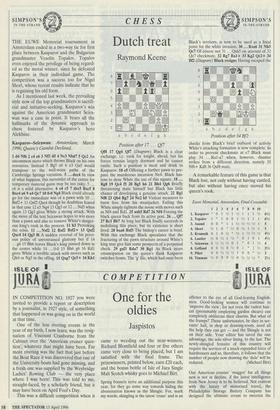1 ISLE OF
ISLE OF
COMPETITION
P, I i mi, , ORM WHISIn
iii lu RA
41, ., if OLT WORM NXNO
UR
One for the oldies
Jaspistos
IN COMPETITION NO. 1927 you were invited to provide a report or description by a journalist, in 1927 style, of something that happened or was going on in the world at that time.
One of the less riveting events in the year of my birth, I now learn, was the resig- nation of Viscount Cranborne from the Cabinet over the 'American cruiser ques- tion', whatever that might have been. Far more riveting was the fact that just before the Boat Race it was discovered that one of the University boats had gone missing, and a fresh one was supplied by the Weybridge Ladies' Rowing Club — the very place where I was born! This was told to me, straight-faced, by a scholarly friend, but it may have been on April Fool's Day.
This was a difficult competition when it came to weeding out the near-winners. Richard Blomfield and four or five others came very close to being placed, but I am satisfied with the final frame. The prizewinners, printed below, earn £20 each, and the bonus bottle of Isle of Jura Single Malt Scotch whisky goes to Michael Birt.
Spring bonnets serve an additional purpose this year, for they go some way towards hiding the abomination known as the Shingle. For, mark my words, shingling is the latest 'craze' and is an offence to the eye of all God-fearing English- men. Good-looking women will continue to 'improve the view', for not even the rudest hair- cut (presumably employing garden shears) can completely obliterate their charms. But what of the frumps? Those unfortunates, be they in ser- vants' hall, in shop or drawing-room, need all the help they can get — and the Shingle is not on their side. Your editor has saved the one advantage, the sole silver lining, to the last. The newly-shingled females of this country will require the services of a much expanded force of hairdressers and so, therefore, it follows that the number of people now drawing the 'dole' will be reduced. (Michael Birt) Our American cousins' maggot' for all things new is not in decline, if the latest intelligence from New Jersey is to be believed. Not content with the luxury of motorised travel, the Philadelphia Storage Battery Company has designed the ultimate cream to sweeten the
cherry on the cake: a wireless which can be fitted into the motor car. Notwithstanding this inven- tion's capacity to distract the motorist, the swank and self-indulgence may give mild offence to a robust Englishman able to keep himself and his passengers amused without recourse to the tyranny of the radio wave. Do Americans not talk one with another — or, if alone, think to some purpose? Apparently not. But there will be few buyers in this sceptred isle. It was Dr Johnson who observed that 'nothing odd will do long'. An early death is devoutly to be wished.
(Tim Hopkins) Miss Isadora Duncan, who shocked Boston by dancing as she felt Nature intended, has cast off her last inhibition.
In a macabre motoring accident, Miss Dun- can, who was 49, threw caution literally to the wind. The lady, widow to Mr S. Essenin, paid for it with her life. She had dined at an elegant Riviera restaurant in Nice, leaving with familiar 'joie de vivre'. Her fate was settled by her fond- ness for flamboyant dress. Her scarf, of generous length, was animated by a local zephyr. Within seconds, Miss Duncan had been throttled to death, her scarf entangled with the motor car's front wheel. Miss Duncan's career, sedulously dedicated to the classical freedom of Greek dance, has concluded in a tragedy beloved of that same culture. We mourn her as we would any soul in flight. But was not the manner of her nemesis a warning — from the very gods she worshipped? (Bill Greenwell) The announcement by the controversial poet, Mr Thomas Stearns Eliot, that he was leaving the Unitarian church in favour of the Church of England, though given a nervous welcome by the latter, caused scarcely a ripple on the calm waters of the former. 'Anyone who has battled with the confused poetic effusions of Mr Eliot will not be too surprised by this latest move. However, how he will cope with a Holy Trinity, surely a potential source of further confusion, must be open to conjecture. Perhaps, given ade- quate time for contemplation in this new "Waste Land", he may wish to return to the singular comfort of his Mother Church. In that event, I can assure him, he will be thrice welcomed, but, let me emphasise, by only one representative of the Church, not three,' said a senior Unitarian cleric. (David Barton) The Savoy Hotel has seen few pleasanter occa- sions than yesterday's dinner held, under the chairmanship of Lord Harris, to mark one hun- dred years of the cricket matches between the Universities of Oxford and Cambridge. Good fellowship abounded, while reflection and remi- niscence proved so congenial to the speakers that accounts had barely reached the mid-1870s when time was regretfully called. Happily, these laudatores temporis acts failed to dim the lustre of the younger set present, and this observer found his eye instinctively drawn towards the flourishing Harlequin, Mr Douglas Jardine. To predict the future course of youth is hazardous (for 'time and chance happeneth to them all'); yet it is surely not fanciful to see Mr Jardine one day leading his comrades against the old Antipodean foe, and, with that blend of zest and cordial sportsmanship that marks the Varsity cricketer, playing his part in strengthening the



































































 Previous page
Previous page